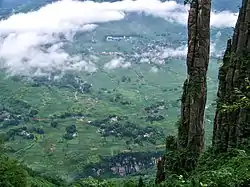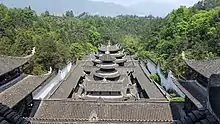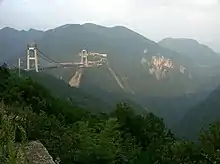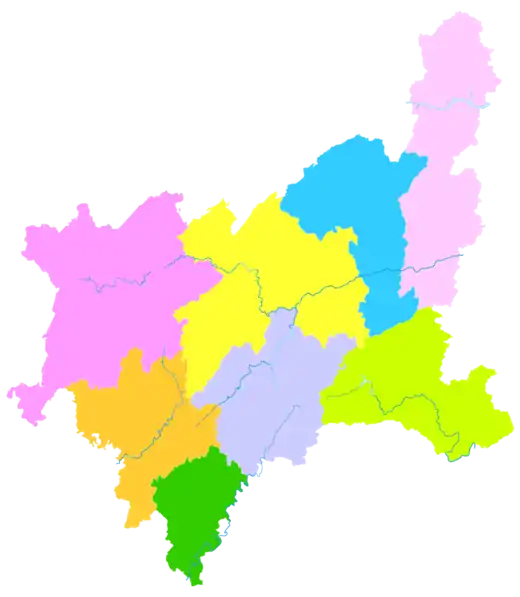Enshi Tujia and Miao Autonomous Prefecture
Enshi Tujia and Miao Autonomous Prefecture (Chinese: 恩施土家族苗族自治州; pinyin: Ēnshī Tǔjiāzú Miáozú Zìzhìzhōu) is located in the mountainous southwestern corner of Hubei province, People's Republic of China. It forms Hubei's southwestern "panhandle", bordering on Hunan in the south and Chongqing Municipality in the west and northwest. The Yangtze River crosses the prefecture's northeastern corner in Badong County.
Enshi Prefecture
恩施州 Enshih | |
|---|---|
恩施土家族苗族自治州
Enrshiv bifzivkar befkar zifzifzoux(Tujia) Entshil tutjadcul maolcul zibzhibzhoud(Miao) | |
 Enshi Grand Canyon | |
.png.webp) Location of Enshi Prefecture in Hubei | |
| Coordinates (Enshi Prefecture government): 30°16′19″N 109°29′17″E | |
| Country | People's Republic of China |
| Province | Hubei |
| Prefecture seat | Enshi City |
| Area | |
| • Total | 24,061 km2 (9,290 sq mi) |
| Population (2010)[1] | |
| • Total | 3,290,294 |
| • Density | 140/km2 (350/sq mi) |
| Time zone | UTC+8 (China Standard) |
| Postal code | 445000 |
| Area code | 0718 |
| ISO 3166 code | CN-HB-28 |
| Website | enshi |
| Enshi Tujia and Miao Autonomous Prefecture | |||||||||
|---|---|---|---|---|---|---|---|---|---|
| Chinese | 恩施土家族苗族自治州 | ||||||||
| |||||||||
| Former name | |||||||||
| Chinese | 施南 | ||||||||
| Postal | Shihnan | ||||||||
| |||||||||
Administrative divisions
There are two county-level cities:[1][2][3]
- Enshi City (恩施市), the prefectural seat
- Lichuan City (利川市)
There are six counties:
- Xianfeng County (咸丰县)
- Laifeng County (来凤县)
- Badong County (巴东县)
- Jianshi County (建始县)
- Hefeng County (鹤峰县)
- Xuan'en County (宣恩县)
| Map |
|---|
History

Imperial
"Endless green mountains to walk on, endless clear water going away" (by a poet of the Tang dynasty)
Republican
Republic of China's Hubei provincial government was relocated to Enshi during the 1937-45 resistance war (against Japanese invasion and occupation).
The Roman Catholic Church had the Diocese of Shinan on the territory of today's Enshi Prefecture.
People's Republic of China
Badong County was the site of the Deng Yujiao incident.
Geography

Enshi Prefecture is located in the west end of Hubei Province, a mountainous belt separating Hubei's Jianghan Plain from the Sichuan Basin.
There are karst phenomena in the region. The most famous of them is perhaps the Tenglong Cave near Lichuan, a county-level city of Enshi Tujia and Miao Autonomous Prefecture. A 290-meter deep karst sinkhole, located near the village of Luoquanyan (锣圈岩村) in Xuan'en County, is described as possessing its own unique ecosystem.[4][5]
The Enshi Grand Canyon is also a well-known scenic area.
Demographics
The total area is 24,000 square kilometres (9,300 sq mi), and the population is 3,800,000. 52.6% of the population belong to the Tujia and Miao nationalities. Enshi is the only autonomous prefecture in Hubei province.
Enshi is also the only part of Hubei which has been included in the Chinese government's Western exploration programme and over the next 5–10 years they will put 50 billion RMB into its development.
Transportation

The prefecture has only a small amount of Yangtze River frontage, but Badong, in the prefecture's northeast, has a Yangtze River port.
The Qing River in the central part of the prefecture, with its cascade of reservoirs, is an important waterway as well.
Due to the mountainous terrain, until recently the prefecture had no railways, and even the highways were of doubtful quality.[6]
_-_Tujia%252C_Enshi_Livery_-_CAN_(11028916024).jpg.webp)
The Yichang−Wanzhou Railway, completed in December 2010, crosses the prefecture from east to west, providing a more direct connection between Hubei and Sichuan than was previously available.[7] In addition, the Chongqing−Lichuan Railway from the Lichuan Railway Station on the Yiwan line connects the cities. A single line now connects Enshi with Beijing and Wuhan as well as many additional cities. The train between Beijing and Enshi takes approximately 24 hours and includes many stops along the way.
The G42 Shanghai–Chengdu Expressway, routed along the same Yichang-Wanzhou corridor, is under construction. The Sidu River Bridge on that road has become the world's highest bridge.
Xujiaping Airport is the only airport in Enshi.
Economy
The soil in Enshi is rich in selenium. Enshi is known as the "selenium capital of China" and is the world's sole independent selenium deposit. Selenium Square in the city is named after this rare element.
The countryside has a diverse range of flora and fauna, including many Chinese herbs. Much of the mountain landscape is covered in virgin forest and is home to pangolins.
Enshi locals are especially proud of their potato crops and consider the potato and tea crops to be the region's agricultural specialties.
Enshi Prefecture possesses significant hydroelectric resources. Among major hydroelectric dams already completed, or under construction, within the prefecture are:
- Shuibuya Dam, on the Qing River in Badong County — the tallest concrete face rock-fill dam in the world.
- Jiangpinghe Dam, on the Loushui River, near Jiangpingh Village, Zouma Town, Hefeng County.
- Dongping Dam, in Wanjia Township (万家乡), Xuan'en County
References
- 恩施土家族苗族自治州历史沿革 [Enshi Tujia and Miao Autonomous Prefecture Historical Development] (in Simplified Chinese). XZQH.org. 6 August 2014. Retrieved 27 December 2018.
全州面积24061平方千米,{...}2010年第六次人口普查,恩施州常住总人口3290294人,其中:恩施市749574人,利川市654094人,建始县412038人,巴东县420840人,宣恩县310368人,咸丰县300618人,来凤县242870人,鹤峰县199892人。
- 恩施州情概况(3) 行政区划 [Enshi Prefecture Overview 3 Administrative Divisions] (in Simplified Chinese). Enshi Tujia and Miao Autonomous Prefecture People's Government. 20 November 2018. Retrieved 27 December 2018.
恩施自治州下辖恩施、利川2个县级市;建始、巴东、宣恩、咸丰、来凤、鹤峰6个县。
- 2017年统计用区划代码和城乡划分代码:恩施土家族苗族自治州 [2017 Statistical Area Numbers and Rural-Urban Area Numbers: Enshi Tujia and Miao Autonomous Prefecture] (in Simplified Chinese). National Bureau of Statistics of the People's Republic of China. 2017. Retrieved 27 December 2018.
统计用区划代码 名称 422801000000 恩施市 422802000000 利川市 422822000000 建始县 422823000000 巴东县 422825000000 宣恩县 422826000000 咸丰县 422827000000 来凤县 422828000000 鹤峰县
- 湖北290米深天坑藏动植物王国. 燕子筑巢昆虫飞翔 [A plant and animal kingdom preserved inside a 290-meter deep Hubei sinkhole]. 淮海晚报 (in Chinese (China)). 2015-05-22.
- "Photos: See the Chinese Sinkhole That Developed Its Own Ecosystem". The Wall Street Journal Blog. 2015-05-22.
- See, e.g., the characterization of the China National Highway 318 and China National Highway 209 as "unstable and unsafe" in Yichang-Wanzhou Railway (SEIA) Archived 2009-08-07 at the Wayback Machine (Asian Development Bank, June 2003), p. 6
- "Yichang-Wanzhou Railway Project" (PDF). Archived from the original (PDF) on 2009-12-11. Retrieved 2009-11-04.
